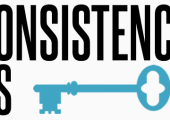I think we can agree that most top marketing professionals are what used to be called a “Type A” personality – high speed, high motivation, attention to detail, internally driven, goal oriented, strong need for control. Sound about right? If so, you’re likely in the right role if you’re a marketer, but are all of these traits actually helping you succeed? Sometimes less is more, and I think as a race, most of us labor under the misconception that we can control much more than we can in reality.
That control issue can lead to problems. We can plan for just about any scenario, we can be prepared for the worst outcome, we can remove or stabilize as many variables as possible, but there is always a large element of the unknown involved in our work. That’s not to say that we can give up responsibility for the outcome of any of it, but there is only so much we can control about the results of our efforts. We can’t go to people’s homes and force them to buy what we have to offer at gunpoint. We can only use history, research, or self-proclamation to divine the likelihood of each one buying a product, lump them all together, and put forth our best pitch based on common characteristics among the group.
We can test, but we can’t control. Test results, be it focus group, direct response test, concept survey, or other method, can only give us a snapshot of the most obvious feelings and actions of the given group at that moment. If you got the same group together again the following month, you might get different results to the same test, based on circumstances beyond our, and their, control. All you can really do is play to the odds, decrease your chances of missing as much as you’re able, and hope to catch potential buyers under favorable circumstances. That’s not control.
On a larger scale, our lives contain the illusion of control as well. Anyone who’s planned an outdoor wedding knows, you can’t control everything. You can have the best vendors, the most elegant choices, the best caterer and decorator and a force-of-nature coordinator, and none of that makes up for the fact that it could rain buckets that day. You can increase your odds by considering timing, location, and site protection, but those are not control, just contingency planning – it’s still raining, you just made it tolerable for the guests by ordering a tent.
That’s not to say that such events don’t have a cause somewhere that can be eliminated, deferred or altered – the Butterfly Effect is a theoretical conceptual diagram designed to show the rippling and far-reaching impact of actions in a closed system that highlights this – but at the end of the chain it is simply a set of unalterable circumstances.
Lack of control can cause us to make errors – lack of recognition of loss of control can lead to disaster. Take a direct marketing test grid. We can’t control those buyers, but we can test that group of uncontrollable people’s preferences as a group, and control for wide differences within the group. When we read the test results, there may be a set of data that appears inconsistent with what we know in history, with what we feel, with what we “think” we know. That data may be discounted as an anomaly, an aberration, some irrelevant variable that isn’t affecting the overall program. But what if that piece of data, when expanded upon and tested further by itself, is critical to a strong response – that the audience needs that portion of the mailing needs to be there as a catalyst to response, and by ignoring it, we negatively affect response to a great degree going forward? Our own sense of control has effectively overwhelmed the data in front of us and reduced our effectiveness and our impact on profits with that mailing mistake.
We can’t control everything, but we can control how we react to things. If your first reaction when faced with an uncontrolled situation is to hide or ignore it, or worse, try to control the uncontrollable, failure is a likely outcome. As marketers we would be better served by our flexibility, our ability to “roll with it” in our reaction to the situation, to make the best of what might be a less than desirable outcome. Plan for the worst, hope for the best, be ready for anything.
Did you find this valuable? You can have more like this delivered right to your inbox weekly, for FREE! Subscribe above. Also, Don’t forget to pick up your copy of “The Marketing Doctor’s Survival Notes”



